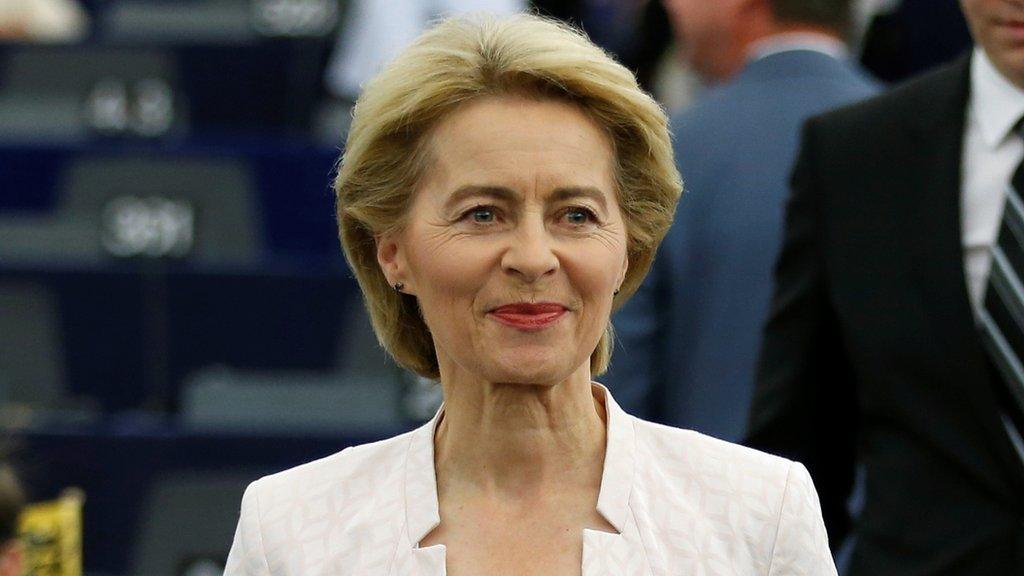European media see troubles ahead for Johnson
- Published
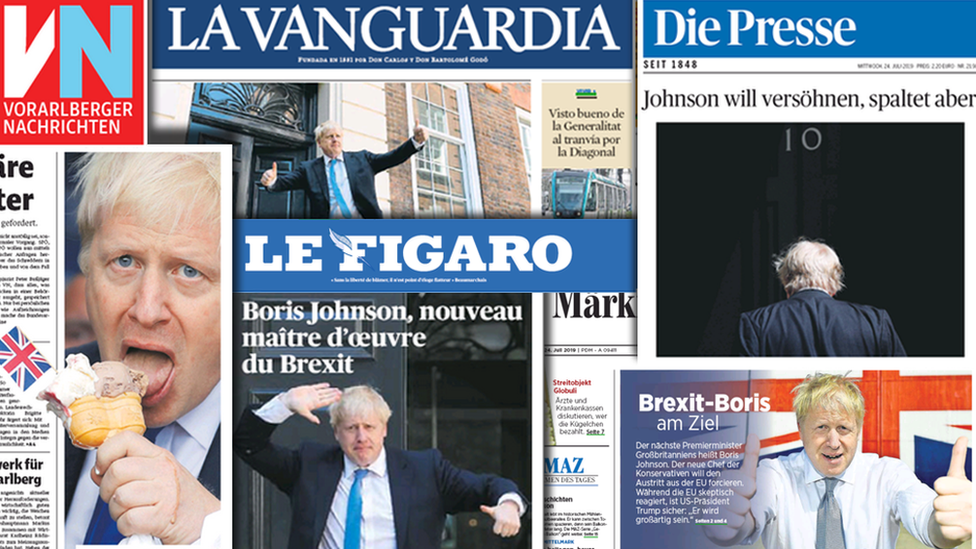
Boris Johnson features on front pages across Europe
Boris Johnson's rise to the premiership is a major story across the European Union, with most commentators expecting that Brexit will define or perhaps even end his term in office.
The new Conservative leader's personality is a major talking point, and some columnists think his alleged lack of firm principles might make him a more flexible figure than hitherto imagined.
'New nadir'
The Irish press homes in on Mr Johnson's approach to the backstop proposal to keep Northern Ireland within the EU customs union.
Colette Browne in The Irish Independent thinks he "can't be trusted as he plays poker with EU over Brexit , the border and the backstop", external, and expects that the "technical solutions" to the problem that the incoming prime minister advocates will be one of his "roads to ruin".
The Irish Times sees Mr Johnson as a "new nadir" in British politics, but holds out some hope that his personality might provide a way out of the backstop impasse.
"The best hope for Ireland and for Europe... is that Johnson will be guided by three of his worst traits... he doesn't mean a word he says, external, he is obsessed with power, and he is willing to betray those closest to him in the pursuit of that power," contends its editorial.
Hungary's conservative Magyar Nemzet gives Mr Johnson the benefit of the doubt over his "sincerity and the fact that the country will recover from any sudden economic shock following its exit from the EU", but fears the split-up of the United Kingdom remains a real possibility.
"The Brexit referendum could further shrink the island, external. Clouds are gathering over London, and a stormy period lies ahead," it warns.
'English Trump'
Concerns about Boris Johnson's personality drive Torsten Riecke to use very harsh language in Germany's usually sober Handesblatt business daily.
He calls the Conservative leader a "political charlatan" and an "English Trump", saying Britain faces a "new ordeal" and possibly a constitutional crisis, external as a result.
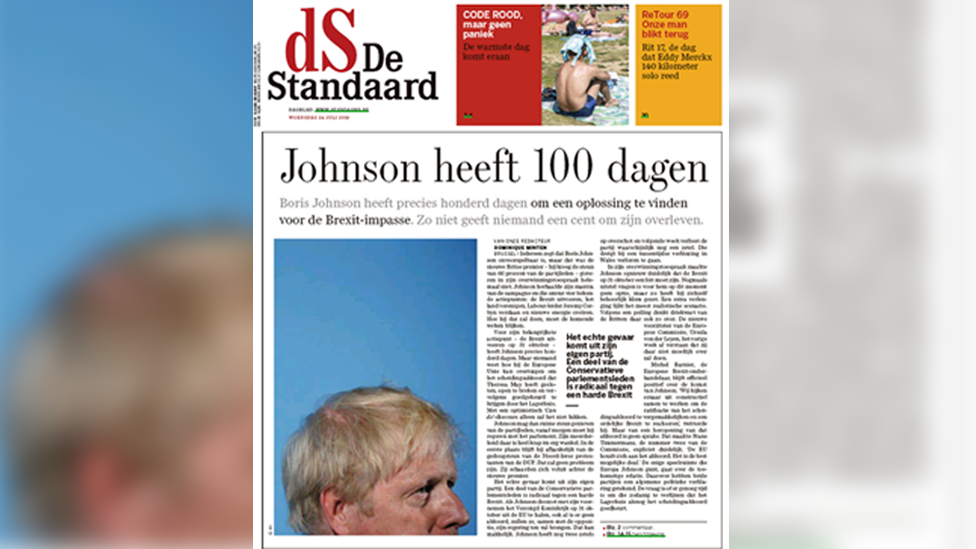
De Standaard says Mr Johnson 'has 100 days'
Belgium's De Standaard is equally damning.
"Rather than the country's interests, he prioritises his own interests, external. That is the common thread running through his life. He even decided to side with the Brexiteers for that reason, even though at heart he is a cosmopolitan European," says its editorial.
Munich's centre-left Süddeutsche Zeitung thinks "everything and nothing is possible" in the case of a politician that one unnamed diplomat called "totally unprincipled", external.
'Churchill turning in his grave'
Some commentators take a leaf out of Boris Johnson's biography of Winston Churchill to compare the two leaders, and not to the incoming prime minister's advantage.
Jedrzej Bielecki, the London correspondent of Poland's Rzeczpospolita, worries that the price of a "mad and desperate" no-deal Brexit could be not only deep economic crisis and the paralysis of political institutions, but also the "loss of Scotland and Northern Ireland" from the United Kingdom, external.
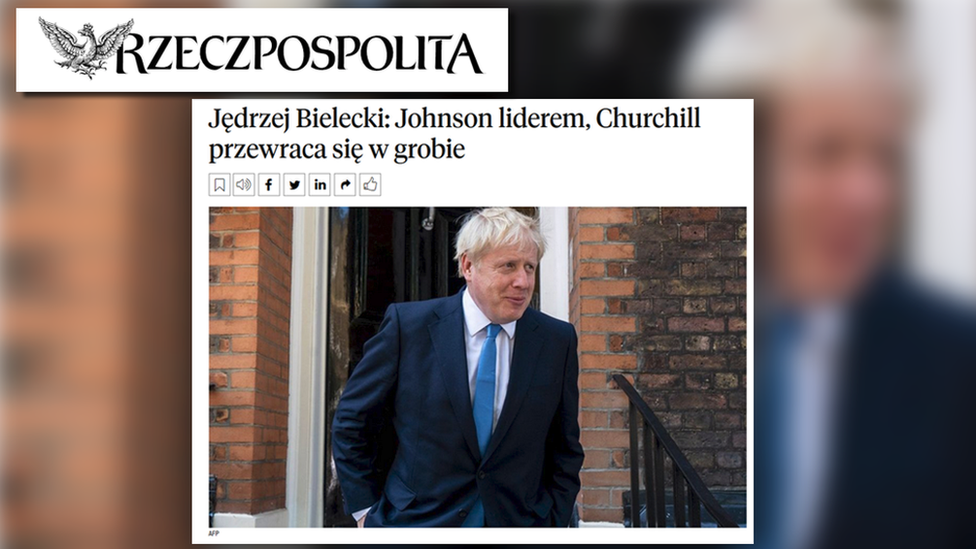
For Rzeczpospolita, Churchill is "turning in his grave"
"Winston Churchill and Margaret Thatcher are turning in their graves at the news of their successor," he writes.
Kathy Sheridan in The Irish Times says Mr Johnson is "already a modern-day Churchill, in that he peddles the same false hope and belief in his own centrality, external".
She wonders what Churchill "might think now of the cast of ignoramuses who think nothing of bulldozing the European Union so painfully constructed by his successors?"
'Lot of optimism'
There are columnists who acknowledge that Mr Johnson has policy proposals other than leaving EU, but see them being overshadowed by Brexit.
In Italy's Corriere della Sera, veteran correspondent Luigi Ippolito says the Conservatives voted for Mr Johnson because he is the "only chance to overcome the schism of their supporters" turning to Nigel Farage's Brexit Party, "and to defeat the Labour Party of Jeremy Corbyn - the real, main threat, external".
"While he promises to improve housing and education and increase the number of police, the key word remains Brexit, external," writes Elodie Goulesque, the London correspondent of France's left-wing Libération.
France's centre-left Le Monde agrees that Boris Johnson may be "versatile, pragmatic and opportunistic", but is "giving Europeans the chills - especially the German government, external - because he represents a hard Brexit".
'Civilised populist'
For Ramón Pérez-Maura in Spain's ABC daily, Mr Johnson's election is the "lesser of two evils" and "the best that could happen to us", as it could mean a rapid solution to the Brexit issue, external.
"The worst option is for the UK to keep us all wandering around aimlessly for another year," he writes.
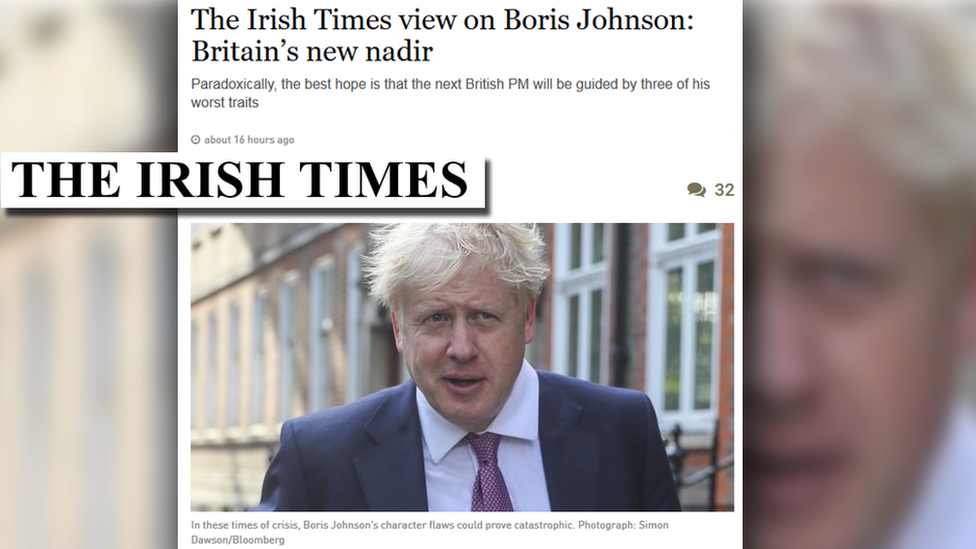
The Northern Ireland backstop is the most urgent problem for the Irish press
A rare journalist admirer of Mr Johnson is the prominent German editor Wolfram Weimer, who tells the N-TV channel that the new Conservative leader is a "man of letters, unlike the crude Donald Trump", and has a "sense of humour and self-irony - an alarmingly rare gift among politicians".
He praises Mr Johnson as a "cosmopolitan liberal" whose "civilised right-wing populist" views mean he will seek a close partnership with Europe, external, despite the German left's desire to turn him into a "new media hate figure".
Florentin Collomp in France's centre-right Figaro certainly thinks the incoming prime minister "will need a lot of that optimism he takes strength from in order to stave off his Brexit problems in parliament, external and remain in power."
'Eaten alive by Brexit'
Looking ahead, few papers think Mr Johnson will win any concessions from the European Union.
The Netherlands' De Telegraaf daily says "Boris Johnson will be received courteously in Brussels... but caving in and starting new negotiations? Not a chance, external."
For Stanislaw Skarzynski of Poland's Gazeta Wyborcza, "Boris Johnson will be the third prime minister eaten alive by Brexit. There will be no honeymoon, external."
The 444 Hungarian news site agrees that "The Brexit monster has propelled Boris Johnson to power, external, but may devour him by the autumn."
BBC Monitoring, external reports and analyses news from TV, radio, web and print media around the world. You can follow BBC Monitoring on Twitter, external and Facebook, external.
- Published16 July 2019
